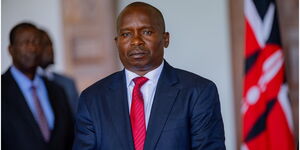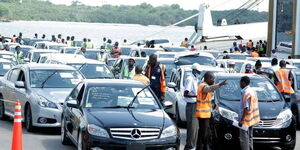The government will have to raise taxes for it to secure a Ksh 262 billion loan from the International Monetary Fund (IMF).
The loan from IMF will be disbursed through the Rapid Credit Facility (RCF) and the Extended Fund Facility (EFF) which Kenya will use to revamp the economy in the post-Covid-19 era.
The loan comes at a cost for taxpayers who will bear the burden as the government bowed to tougher conditions set by the global financial institution. IMF wants the Kenyan government to slowdown borrowing as its debt level is inching towards unsustainable levels increasing the risk of defaulting on the loans.
IMF directed Kenya to find other sources of revenue, with the most available alternative being raising of taxes to fund development projects and meeting a ballooning wage budget.
"The authorities program aims at reducing debt vulnerabilities through a multi-year fiscal consideration effort, centred on raising tax revenues and tight control of spending, which would safeguard resources to protect vulnerable groups," IMF said in a statement.
The second condition is that Kenya freezes growth of the national budget, which heavily relies on borrowing. Kenya's budget in the 2020/21 financial year stood at Ksh 2.7 trillion with the amount likely to rise to Ksh 3 trillion in the proposed 2021/22 financial year. Treasury CS Ukur Yatani hinted at borrowing to cover the deficit.
The IMF also suggests that Kenya restructures and privatises some of the parastatals so as to reduce the pressure on the wage budget. Restructuring means that thousands of civil servants will be retrenched with others forced to retire early.
President Uhuru Kenyatta has warmed up to IMF and World Bank as sources of loans, avenues which former President and economist Mwai Kibaki had shied away from.
The development comes after Kenyatta, in December 2020, hit out at global financiers urging them to keep off Kenya's policies and affairs.
“I plead with you with respect. Respect us and we will respect you. Even them (development partners) have problems in their own countries so they have no business to come and lecture us. But I say that in good faith that I will not allow that. We shall not allow that to happen," Kenyatta said.
The president, however, appears to have found it difficult to convince IMF to offer loans to Kenya at convenient terms as Kenya's appetite for loans increases. On Wednesday, February 10, the president appeared to have fewer options but to raise taxes as the only way to fund his development projects.
"I will not lower taxes. You will have to pay because there is no other way we can build facilities, roads, and schools. We must pay taxes. The only thing we can do is making the remittance of taxes easier to avoid stalling business," he said while speaking at the National Cargo Deconsolidation Centre in Nairobi.
Treasury CS Ukur Yatani already introduced Minimum and Digital Service taxes in January 2021. Other tax measures include Value Added Tax collection (VAT), comprehensive audit of exemptions to identify multiple uses of single exemption and making relevant tax demand and integration of government systems to allow for the third-party data matching to improve service delivery.
Kenya Revenue Authority (KRA) seeks to collect Ksh 1.57 trillion for the financial year 2020/21.












